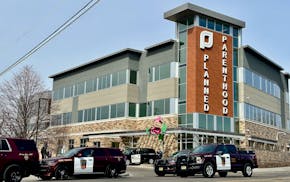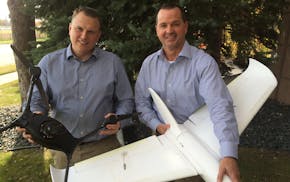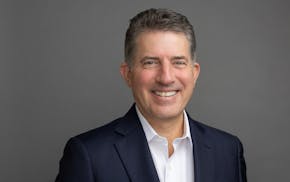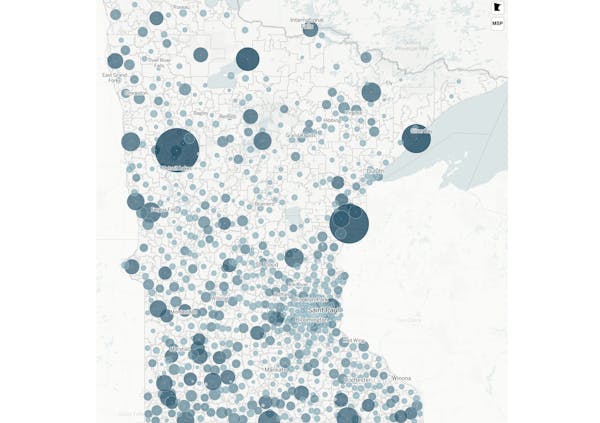Two years ago, Jeffrey Scott left a 25-year career in financial services to open a gym on Minneapolis' North Side, where he went to high school.
Now, after a second state-ordered shutdown of fitness centers to fight coronavirus, Scott's gym is facing grim prospects. "It's once again devolving to the point where I honestly don't know whether we'll survive it," he said.
With Minnesota's 800 gyms closed at least through next week — and Gov. Tim Walz expected on Monday to say whether they will stay closed into January — many other fitness club owners and operators fear long-term damage.
When the coronavirus arrived this spring, Walz ordered businesses that draw large groups of people, like restaurants and fitness centers, to close from mid-March through early June. As virus cases surged last month, Walz on Nov. 18 ordered another closure for at least four weeks.
The Minnesota Department of Health's contact tracers in September began asking Minnesotans who tested positive for COVID-19 about their use of fitness centers. That research identified 48 outbreaks of coronavirus involving 734 gym members and three employees. The most cases, 80, were tied to a fitness center at the University of Minnesota, one of six college campus gyms with an outbreak.
While the numbers are small compared with the 242,000 Minnesotans who tested positive through Nov. 18, state health officials say they set a high bar for pegging a gym's involvement in spread of the virus. They believe the virus spreads through fitness centers at a greater rate than data captures.
"The longer you are near someone in a smaller space and if you're doing things that make you breathe harder, the chance of infections go up," Walz said on Dec. 1 as he acknowledged the inconsistency of closing health clubs while big retailers and liquor stores are open.
With executives from Minnesota-based chains Life Time, Anytime and Snap Fitness leading the way, the state's fitness executives and owners have waged a campaign to pressure Walz to let them reopen. They offered to adopt more stringent safety measures, including reducing occupancy to 10 from 25% and requiring people to wear masks as they work out.
They dispute the Health Department's view of the data and portrayal of the risks people face in gyms. And they note they're in the business of helping people fight obesity, diabetes and other risk factors for severe cases of COVID-19.
"There is gross negligence in the decisionmaking process," said Bahram Akradi, founder and chief executive of Chanhassen-based Life Time, which has 152 clubs nationwide and 23 in Minnesota. The firm filed a data practices request with the state about the spread or transmission of COVID-19 at fitness centers.
"We're in the health business," said Chuck Runyon, chief executive of Self-Esteem Brands, which operates Anytime Fitness. "This isn't just 'come work out and let's charge money.' We all have to take health seriously as club owners. We're taking COVID seriously."
John and Kelsey Schultz believe they've been responsible gym owners. They sold 13 pieces of equipment to make it easier to social distance at their Anytime Fitness gyms in Sartell and Sauk Rapids. They hired someone specifically to clean those two facilities and their yoga business in Sartell, called KPower Yoga.
Since reopening, three people have called the gym to say they'd tested positive for COVID. Because the clubs now require registration for classes, Kelsey Schultz said she could easily notify everyone in the class to get tested, even identifying those standing next to the infected member.
"In every case we quarantined them from the gym until they got tested and could wait some time out. None of those led to additional positive cases," she said. "You can say there's three cases, but it didn't come from the gym."
Brandon Reiter, owner of Plainview Wellness Center in Plainview, kept it open after the Nov. 18 closure order, which he called "a massive overreach that will harm a lot of small businesses." Attorney General Keith Ellison sued Reiter and, last week, a judge ruled in the state's favor.
"I respect the judge's decision, although I don't agree with it," Reiter said. "I knew it was going to be an uphill battle."
There's scant data about how the coronavirus spreads in gyms. Studies from the British journal Nature and the Centers for Disease Control and Prevention suggest that working out at gyms may be less risky than other activities, though researchers in both studies acknowledged limitations.
The International Health, Racquet and Sportsclub Association (IHRSA), a trade group, sponsored a study that found a "virus-to-visit" ratio of 0.002% out of 49.4 million gym visits between June and August. Some experts questioned the research, but the figures have been cited often by Minnesota's fitness leaders and the IHRSA, which stands by them.
"We understand that the risk of contracting COVID-19 is not — and can never be — zero for any business," IHRSA spokesperson Sami Smith said in an e-mail. "Overall, health and fitness clubs are not hot spots."
Minnesota health officials identified outbreaks at 10 Life Time locations, with two clubs tied to separate outbreaks. The clubs were linked to 198 confirmed coronavirus cases.
Life Time's corporate figures show an infection rate of less than 1% among 3.17 million visits to its Minnesota gyms since reopening. Mitigation efforts such as sophisticated air purification systems and massive cleaning protocols are working, Akradi said.
Akradi said his larger concern is the beating the industry has suffered at the hands of public officials who give the impression that clubs aren't safe.
In a video posted on Life Time clubs' social media pages and elsewhere, Akradi said the latest closings were "massively damaging" and leading to "consumer confusion."
"Health clubs are not the problem," he said in the video. "They are the solution to maintaining public health."
But even with Life Time operating at 25% capacity, the company is losing money, Akradi said in an interview. The company permanently laid off 300 people this summer.
"This is not about making money," he said. "Anybody who thinks I'm some business guy worrying about the financial damage and not making money, that's just so wrong. I have committed myself and this company to the health and well-being of our entire community."
Congress and the Legislature are debating whether to provide special financial relief to health clubs. A bipartisan bill introduced in Congress in early October would provide $30 billion in grants to club owners, capped at 10% of losses of the 2019 revenue, or $10 million.
For Scott, owner of the small gym in north Minneapolis, access to financial support will be key. This summer he considered selling off his equipment at ME & I Fitness and throwing in the towel.
As he built the business, Scott developed classes for seniors, worked with student-athletes and offered a diabetes prevention program. He lacks the deep pockets of corporate gyms and didn't apply for a federal forgivable loan because his seven personal trainers are independent contractors. He raised $2,000 on a GoFundMe page.
As lawmakers develop grants and loans to help small businesses, Scott fears a one-size-fits-all approach.
"They're making unilateral decisions and treating every business the same," said Scott, who has joined a coalition of small-gym operators called SWEAT Minnesota. "We're not all the same size."
Scott's elderly mother lives with him, so he understands measures to limit the spread of the coronavirus and mitigate risks to his business and loved ones. It frustrates him to see people out shopping or gathering in large groups, not wearing masks or not seeming to take the risk seriously.
"Change won't happen until the unaffected care," he said.
Staff writers Jessie Van Berkel and Jim Walsh contributed to this report.

Planned Parenthood North Central States to lay off 66 workers, restructure presence in Minnesota

John Deere buys St. Paul precision ag company Sentera
New virus is wiping out Minnesota turkey flocks, costing farmers $112M so far

Part of the family for 75 years, 19th-century house near Lake Minnetonka listed at $2M

